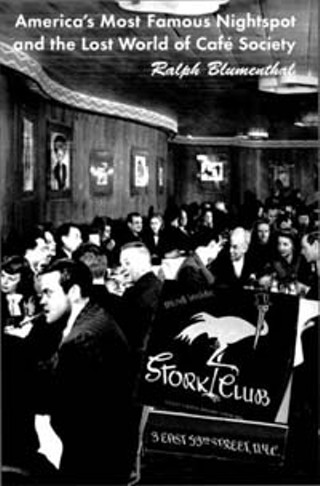Book Reviews
Southerners, Strange Foreigners, and Unabashed Perverts
By Clay Smith, Fri., June 2, 2000

Stork Club: America's Most Famous Nightspot and the Lost World of Cafe Society
by Ralph BlumenthalLittle, Brown, and Co., 298 pp., $25.95
Carl Sandburg went to the Stork Club once. Sherman Billingsley, its owner, didn't recognize the poet and asked someone what he did. He's a writer, came the reply. "Tell him to stick in 'Stork Club' once in a while," Billingsley advised. Sandburg never did write about the Stork Club but judging from New York Times writer Ralph Blumenthal's seductive new account of the legendary nightclub, he's one of the few people who didn't suffer in some way for refusing to do what Billingsley said.
The Stork Club, "where day was mere prelude to the night," attained its pinnacle of cool in the 1940s, when movie stars, political stars, well-heeled debutantes, and gangsters all scrambled to get in. It didn't happen overnight. Billingsley grew up dirt-poor in Oklahoma. When he reached the fifth grade, his parents had scraped together enough money to send him to a small private school, but that didn't take: He realized that it was far easier to just give the headmaster the $2 weekly tuition and skip out to the local bars and gambling houses to see how they were run. Like his brothers, Billingsley spent a good deal of his time as a young man dodging the law for bootlegging.
When he arrived in New York during the roaring Twenties ("in his roaring twenties," Blumenthal quips), he was still on the lam; eventually, he went to prison. Once his ignominious past was supposedly behind him, Billingsley got to the serious business of entertaining people. The Stork Club began as a Jazz Age speakeasy, when it was owned 70% by Billingsley and 30% by three mobsters who didn't really mind those percentages very well and were content to "borrow" what they needed from the club in exchange for "protecting" it. Gradually, Billingsley became full owner of the club and ran things the way he had always wanted to. "If you know them, they don't belong in the Stork Club," he wrote on a blackboard in the kitchen for all the staff to see. He placed microphones in flower pots to monitor everything that was going on. One night Billingsley realized that madam Polly Adler was sitting at a table, so he ordered her and her guest to leave. They refused; he had some waiters remove the table they were sitting at until they were so embarrassed they had to leave. He was an inveterate philanderer who almost left his wife for Ethel Merman. But people still flocked to Billingsley and his Stork Club, despite his catalog of bad decisions and vengeful habits. That, more than anything, may be the real story here, and Blumenthal tells it in a smooth and engaging way that harbors all the panache Sherman Billingsley could have hoped for.








